Returning To Nuclear Deal Will Be A Big Mistake, Bolton Tells Iran International
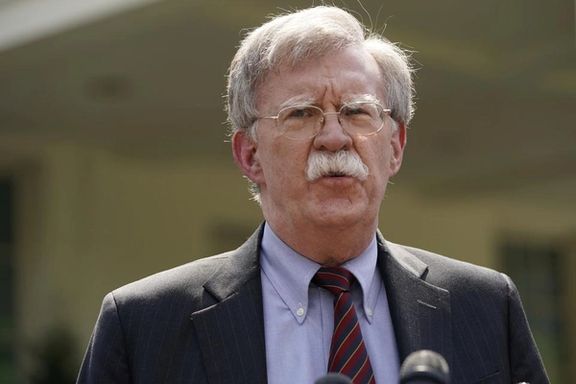
Former US national security adviser John Bolton says restoring the nuclear deal between Iran and world powers increases the likelihood of a war between Iran and Israel.

Former US national security adviser John Bolton says restoring the nuclear deal between Iran and world powers increases the likelihood of a war between Iran and Israel.
Bolton told Iran International’s Fardad Farahzad on Tuesday that if the Biden administration returns to the 2015 nuclear deal with Iran, it will make a big mistake because Israel will feel threatened, intensifying the proxy conflict between the Islamic Republic and Israel to a full-fledged war.
The possibility of reviving the JCPOA is very low, and if the Vienna talks fail, on the one hand, "Israel or others" may take covert or overt action to stop Iran's nuclear program, and on the other hand, sanctions against the Islamic Republic will increase.
In response to a question about the joint naval drills between the US Navy and the United Arab Emirates in the Persian Gulf, he noted that the Iranian threat in the region has reached a very serious point but the possibility of a full-blown war in the short term is still very low, adding that there is no real possibility of a war between Iran and the US because it is tantamount to “suicide” for the Islamic Republic.
US Central Command said on Tuesday that the naval forces of the US and the UAE have started a 10-day drill, codenamed Iron Defender.
Earlier on Tuesday, Connecticut Democrat Senator Chris Murphy told Iran International that "It would be tragic if we didn't get back into the nuclear agreement. I have yet to hear Republicans present a plausible alternative for how we keep the region and the world safe from nuclear weapons without this diplomatic agreement."
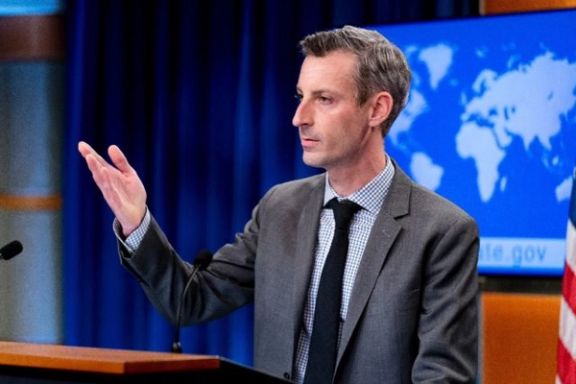
In response to Iran International, US State Department said if Iran is ready to drop demands beyond the JCPOA, Washington can return to the deal “very swiftly”.
Answering a question by our correspondent Samira Gharaei at the State department briefing on Tuesday about claims by Iranian Foreign Minister Hossein Amir-Abdollahian that the Islamic Republic has proposed new initiatives aimed at reviving the nuclear deal, spokesman Ned Price implicitly confirmed the news but avoided directly commenting on Iran's proposals.
Price reiterated that Washington and its European partners are ready to conclude an agreement in Vienna for the mutual compliance with the JCPOA, noting that for that to happen, “Tehran needs to decide to drop demands that go beyond the scope of the JCPOA”, suggesting that the new proposals by Tehran include demands extraneous to the 2015 accord.
He confirmed that Tehran and Washington are engaged in indirect regular contact via Enrique Mora, the European Union coordinator for the Iran nuclear talks, saying, “We await a constructive response from the Iranians, a response that leaves behind issues that are extraneous to the JCPOA.”
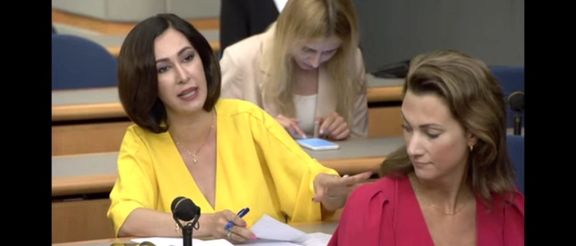
Earlier in the day, Iran's Atomic Energy Organization released a copy of its answers to IAEA questions about origins of uranium found at three undeclared locations, saying “sabotage” is the only explanation.
The document that was released to the media on Tuesday was earlier submitted to the International Atomic Energy Agency, which rejected the explanations as "technically not credible".
Iran agreed March 5 to provide written explanations by March 20 of long-standing issues in its nuclear work before 2003, and to clear up remaining queries by June 21. The latest quarterly report by the UN watchdog expressed dissatisfaction with Iran’s response to agency over sites not declared as part of the nuclear program where inspectors detected traces of uranium. This led to a resolution critical of Iran’s nuclear cooperation by the agency’s board of governors on June 8.
In its answers, Iran maintained that the only plausible explanation for such traces is probably sabotage by foreign elements at Marivan, Varamin and Turquzabad sites, pointing out that the Varamin center, near the capital Tehran, was "never" used for nuclear activities.
Iran said the IAEA’s claims about storage of nuclear material and/or conduct of nuclear-related activities, at Varamin are not supported by valid proofs and are misleading, noting that “the initial activities conducted in this location had been exploitation of sodium sulphate from the soil and water of the surrounding region.”
For Marivan, which is a misnomer as the site is located near the city of Abadeh in the southwestern Fars province, Iran said the origin of the particles is "unknown" and insists the site was used for "the exploitation of fireclay through a contract with a foreign company decades ago" hence the IAEA’s “conclusion is absolutely false, unrealistic and biased.”
Iran claims it carried out its own investigation in Turquzabad and "did not find the origin of the particles" reported by the IAEA.
Later on Tuesday, the head of the Atomic Energy Agency of Iran, Mohammad Eslami, said that Iran’s contacts with the International Atomic Energy Agency are still underway, reiterating that Iran will act based on the safeguards protocol.
The resolution called on Iran to engage with the IAEA, the United Nations nuclear watchdog, without delay and expressed “profound concern” at Iran’s failure to satisfy the agency over the traces of uranium.
Following the resolution, Iran retaliated, telling the IAEA it plans to remove more monitoring equipment, but intends to maintain a basic level of monitoring and inspectors’ access as required under the Nuclear Non-Proliferation Treaty (NPT).
The resolution comes with year-long talks paused since March between Iran and five world powers aimed at reviving the 2015 Iran nuclear deal, the JCPOA (Joint Comprehensive Plan of Action).
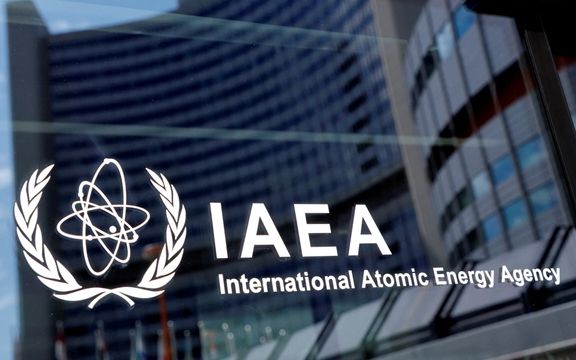
A former senior Iranian lawmaker, Heshmatollah Falahatpisheh, says Iran and the United States should negotiate directly and without Russia, China and Europeans.
This comes while Iranian politicians seem divided over how essential the nuclear talks are for Iran. While, Falahatpisheh said in an interview with Khabar Online that it is essential for Iran to stick to the 2015 nuclear agreement, the former spokesperson of the Iranian Foreign Ministry, Ramin Mehmanparast told Didban Iran news website that the clock is ticking in Iran's favor and Tehran will benefit from prolonging the negotiations.
Falahatpisheh, the former chairman of parliament’s national security and foreign policy committee, argued that unlike what Iran's former President Mahmoud Ahmadinejad once said, UN resolutions are not simply “shreds of paper,” and if the IAEA board of governors issues a resolution, it can shift Iran's nuclear case from the UN nuclear watchdog to the Security Council, where member states can return all the previous international sanctions against Iran.
However, Falahatpisheh did not mention that in 2006 when first international sanctions were imposed, the United States, China and Russia spoke in one voice about Iran's nuclear case while in 2022, and in the aftermath of the Russian invasion of Ukraine and sanctions against Russia, Moscow might veto any UNSC resolution against Iran.
Nonetheless, Falahatpisheh who has served as a lawmaker for 12 years and is currently teaching at the University of Tehran is adamant that neither Iran nor the United States see the revival of the JCPOA as their top priority.
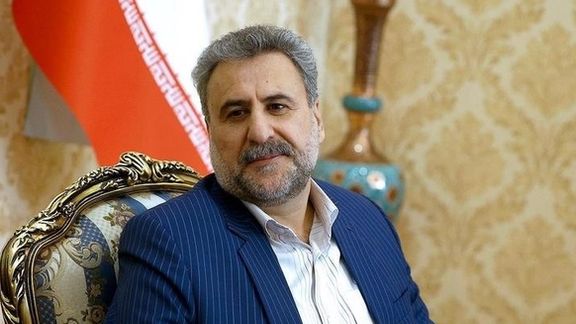
He added that if the JCPOA is to be revived, the only players who should remain at the negotiating table are the main beneficiaries, that is Iran and the United States. He repeated his position first expressed in March that Tehran and Washington should marginalize Russia, China and the three European states if they really wish the talks to be fruitful.
The US has always welcomed direct talks, even during former president Donald Trump’s administration that withdrew from the 2015 nuclear deal and imposed sanctions, but Iran’s Supreme Leader Ali Khamenei is ideologically opposed to it.
Falahatpisheh explained that the JCPOA is no longer a priority in Iran as the country has shifted from an economy geared toward development to one of austerity, aimed at providing the bare necessities for the nation.
He argued that Iran has handed over its fate to “Russian and Chinese lobbies” whose first and foremost concerns are the interests of their own countries, and if Tehran moves toward acquiring nuclear weapons Russia and China will certainly act against Iran.
Meanwhile, Former Foreign Ministry Spokesman Ramin Mehmanparast said: “Westerners think that Iran's only weak point is its domestic economy and wish to secure their interests by exerting maximum pressure on Tehran.”
The former diplomat added: "Iran's national interests are tied to the JCPOA and senior officials [Islamic Republic jargon for Supreme Leader Ali Khamenei] have set a red line for Iranian negotiators. We should make sure that we have a powerful presence in the negotiations as Westerners try to create tensions to blackmail Iran and get concessions while conceding little in return."
"On the other hand, the West considers Iran's powerful regional presence and its missile program as Tehran's two points of strength. They wish to weaken us in these two areas, but the Islamic Republic has made it clear that these are not negotiable," said Mehmanparast.
He concluded: "The clock is ticking in our interest and the longer the negotiation process becomes we will have more time to sort out our economic problems."
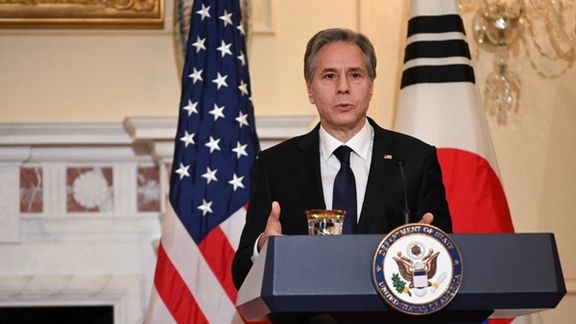
Antony Blinken, while lauding the 2015 Iran nuclear deal Monday, warned that Iranian actions to limit UN monitoring efforts might close the door to its revival.
Separately, he also said the US will “cooperate” with Israel to stop Iran weaponizing.
In a joint press conference Monday with South Korean foreign Minister Park Jin the United States Secretary of State praised the 2015 deal – the JCPOA (Joint Comprehensive Plan of Action) – as “the most comprehensive and complete monitoring and inspections regime of any arms control agreement yet put in place.”
At the same time, Blinken voiced concern over Iran’s negotiating tactics in the stalled Vienna talks. “But what we’ve seen is Iran continuing to try to inject extraneous issues into the conversation, into the negotiation, that simply have no place there.”
Referring to year-long talks between Iran and world powers to revive the 2015 agreement, Blinken said that “a lot of work went into seeing if we could return to mutual compliance with the JCPOA” but “it is fundamentally up to Iran to decide whether or not it wishes to re-engage.”
The Biden administration came into office committed to restoring the JCPOA, from which President Donald Trump withdrew the US in 2018 calling the deal “the worst in history.” Trump’s ‘maximum pressure’ pressure sanctions on Iran were followed in 2019 with Tehran expanding its nuclear program beyond JCPOA limits, a move that accelerated after the election of Joe Biden.
Cooperation with Israel
In a video address to the American Jewish Congress Forum delivered Monday, Blinken said “we are continuing our close coordination with our Israeli partners to prevent Iran from developing” a nuclear weapon.
This came with claims in the New York Times that Israel, which opposes the JCPOA, had poisoned two Iranian scientists, Ayoub Entezari and Kamran Aghamolaei, who were in May reported dead from food poisoning.
The November 2021 killing of scientist Mohsen Fakhrizadeh, which outraged the Iranian parliament and led it to pass legislation expanding Iran’s nuclear program, was widely attributed to Israel, as were four killings and one attempted murder 2010-12.
“We have shifted into a higher gear,” Israeli Prime Minister Naftali Bennett said last week at a meeting of parliament’s defense and foreign affairs committee. “We are acting at all times and places, and we will continue to do so.”
Israel has also been carrying out widespread military drills reported by the Israeli media as simulating attacks on Iran.
Biden criticized from both sides
The Biden administration’s approach has led to nervousness in the European Union, which has led efforts to keep open a diplomatic path with Tehran and it concerned over what is perceived as lethargy in the face of Israeli saber-rattling.
In the US, criticism of the US administration’s approach has been growing as the Iranian nuclear program continues to expand under reduced monitoring by the United Nations’ International Atomic Energy Agency (IAEA).
At the beginning of June, Robert Menendez, chair of the Senate’s Foreign Relations Committee, said “hope is not a national security strategy” and more recently that restoring the JCPOA was not in US interests. Menendez called for a “comprehensive strategy” over Iran.
Supporters of the JCPOA agree Biden’s approach has failed. The president had “ruled out the symbolic concession that would be most likely to break the months-long diplomatic impasse [taking Iran’s Revolutionary Guards off the US list of ‘foreign terrorist organizations,’ reportedly an issue in talks],” Ryan Costello, policy director of the National Iranian American Council, wrote in a piece published June 9.
But opponents of making concessions to Iran say removing the IRGC from the US terror list is not a symbolic act at all, as the military-intelligence outfit actively pursues a policy to harm Americans and allies.
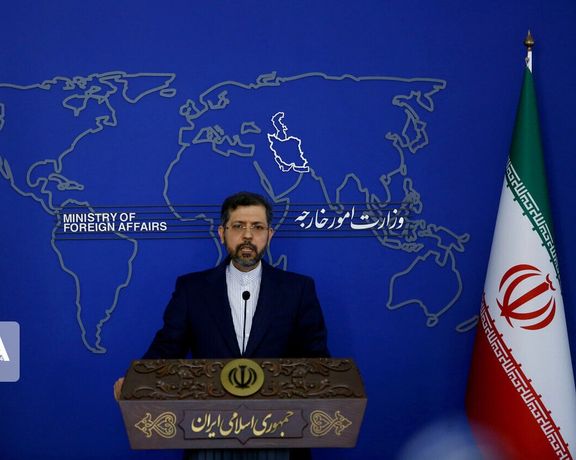
Iran’s foreign ministry spokesman on Monday dismissed a critical resolution passed last week by the UN nuclear watchdog, the IAEA, criticizing Iran for its lack of cooperation.
Saeed Khatibzadeh launched his defense of Tehran’s policies at a press conference on Monday by attacking a recent trip by the International Atomic Energy Agency (IAEA) Director General Rafael Grossi to Israel.
Defending the government’s decision to reduce cooperation with the UN nuclear watchdog as a reaction to the resolution critical of Iran, he said, “We could not leave the IAEA’s political and non-technical action unanswered. Our response was decisive and appropriate.”
The resolution called on Iran to engage with the IAEA without delay and expressed “profound concern” at Iran’s failure to satisfy the agency over traces of uranium found at three undeclared sites and highlighted earlier in June in a report from by Grossi.
"The abrupt change in the IAEA chief’s tone, his manner of negotiations, and his discourse when he addressed the European Parliament [earlier in May] clearly shows that he was acting on the orders of an outside player," Khatibzadeh said.
Relations between Iran and the Agency continue within the technical framework, he added, saying that if Grossi wants to come to Iran within the framework of agency, he should have an agenda by the agency, but he can come as a tourist.
Saying that Grossi made a trip to the wrong place and at the wrong time and “met with wrong people, he added, “It is unfortunate that the director general of the International Atomic Energy Agency has granted the unlawful regime of Israel permission to make a mockery of the international organization through its agents, and erode its credibility.”
Reiterating that the move seriously harmed the credibility of the UN nuclear watchdog, Khatibzadeh said that “These actions have discredited the achievements of international organizations. Under the Statute of the IAEA, its chief is obligated to ensure the independence and impartiality of the organization.”
Iran told the IAEA it plans to remove more monitoring equipment after the 35-member IAEA board Wednesday passed the resolution. Tehran says it intends to maintain a basic level of monitoring and inspectors’ access as required under the Nuclear Non-Proliferation Treaty (NPT).
On Sunday, Foreign Minister Hossein Amir-Abdollahian said Tehran is resisting excessive demands presented “by the other side” in talks to restore the 2015 nuclear deal that have stalled since March. The Iranian parliament and all Friday Prayer Imams in Iran, who are representatives of the Supreme Leader, backed the decision to reduce relations with the IAEA.
Khatibzadeh also touched on the Vienna talks, saying an agreement is within reach if the United States abandons delusions and fulfills its commitments.
“If the agreement is finalized in Vienna tomorrow, all the measures carried out by Iran are technically reversible,” he said.
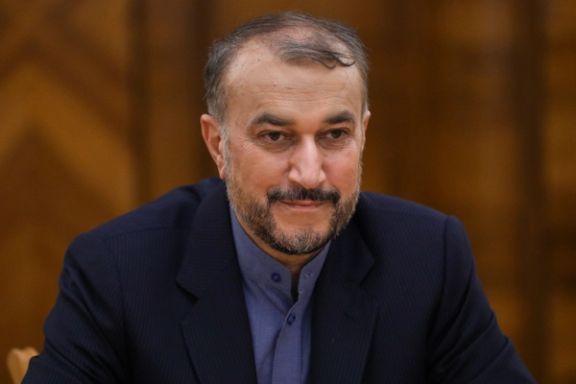
Iran’s foreign minister says Tehran is resisting excessive demands presented “by the other side” in talks to restore the 2015 nuclear deal that have stalled since March.
Hossein Amir-Abdollahian made the remarks on Sunday after attending a session of the Parliament’s Committee on National Security and Foreign Policy to brief lawmakers about a resolution passed by the board of governors of the International Atomic Energy Agency (IAEA) to condemn lack of cooperation by the Islamic Republic.
“Every time that the opposite side put forth excessive demands during the [Vienna talks], we used the country’s own tools and power, so that they would understand that the interests and welfare of the Iranian nation were important to us,” he said without elaborating on the tools, but he was probably referring to the government’s decision to reduce monitoring access to the UN nuclear watchdog.
Iran told the IAEA it plans to remove more monitoring equipment after the 35-member IAEA board Wednesday passed the resolution. Tehran says it intends to maintain a basic level of monitoring and inspectors’ access as required under the Nuclear Non-Proliferation Treaty (NPT).
In a statement issued by the Iranian parliament on Sunday, 260 lawmakers slammed the IAEA's “excessive, politically-motivated measure,” saying the resolution proves that the agency and its director general have lost all their technical credibility, in reference to Rafael Grossi’s recent visit to Israel.
On Friday, all Friday Prayer Imams in Iran, who are representatives of the Supreme Leader, backed the decision to reduce relations with the IAEA.